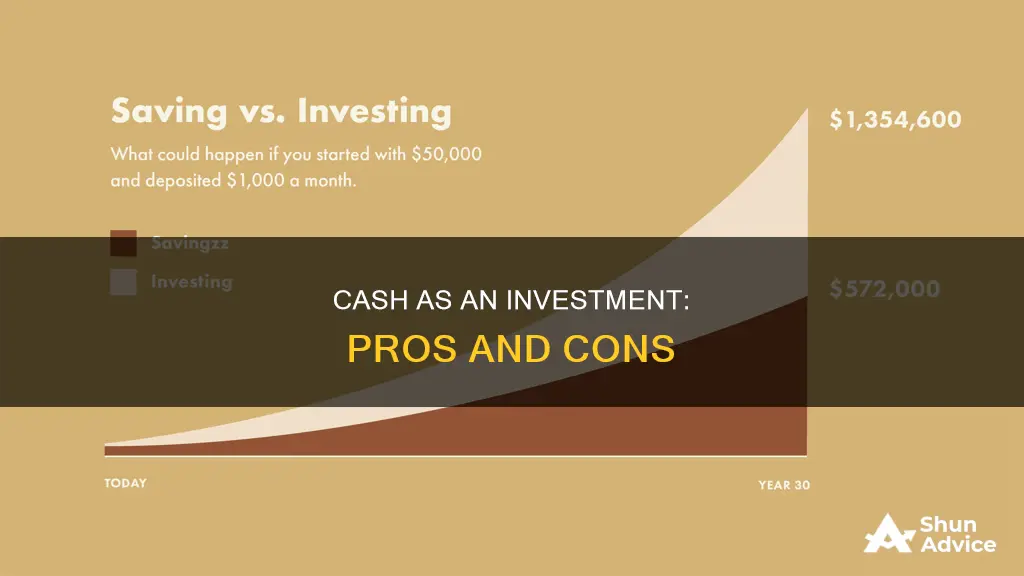
Cash consideration is a term used in finance to describe the purchase of a company's outstanding stock shares using cash as the form of payment. This is a common strategy employed by acquiring companies in mergers and acquisitions (M&A) deals to convince the target company's shareholders to sell their shares. Cash consideration is often preferred by shareholders as it does not affect the future performance of the new combined company and offers liquidity. However, it is important to consider the tax consequences of such transactions, as cash payments are subject to taxation, resulting in a loss of earnings for the seller.
| Characteristics | Values |
|---|---|
| Definition | Cash consideration is the purchase of the outstanding stock shares of a company using cash as the form of payment. |
| Who uses it | Acquiring companies use cash consideration to purchase the stocks of a target company in cash. |
| When is it used | Cash consideration is used in mergers and acquisitions (M&A) deals. |
| Benefits | Cash consideration is beneficial for competitive bidding as shareholders tend to prefer cash payments. It is also beneficial for sellers as it closes deals quickly and poses fewer risks. |
| Limitations | Cash consideration results in a loss of earning power due to taxation. It can also drain a lot of cash, which may be needed for future projects. |
| Alternatives | Alternatives to cash consideration include stock-for-stock payments, debt financing, and a combination of cash and shares. |
What You'll Learn

Cash consideration in mergers and acquisitions
Cash consideration is a term used in mergers and acquisitions (M&A) to describe the purchase of a company's outstanding stock shares using cash as the form of payment. An all-cash offer is one way for an acquirer to buy a stake in another company during an M&A transaction.
Cash consideration is usually preferred by shareholders, but they may sometimes prefer other forms of consideration, such as stock or debt instruments. In a competitive bidding process, shareholders are more likely to accept cash consideration as it does not affect the future performance of the combined company. Cash consideration is also more likely to be accepted when shareholders are uncertain about the viability of the deal, and the acquirer may offer a premium price using cash only.
In a corporate acquisition, the acquirer will use cash to purchase a majority or all of the target company's shares. This type of transaction benefits the acquirer in a competitive bidding process, as the seller is more likely to consider an all-cash deal rather than other purchase offers that include debt financing. For the seller, accepting cash consideration means forfeiting any gains generated by the appreciation of the acquirer's stocks.
There are limitations to cash consideration. It will result in a loss of earning power on the money due to taxation. The sale of shares is a taxable event, and the target company's shareholders will need to pay a tax percentage on the amount of money received from the sale. Shareholders may be better off accepting a stock-for-stock transaction, as it is not a taxable event.
Alternatives to cash consideration in M&A transactions include stock-for-stock payments and debt financing, each with its own tax and financial considerations.
Untaxed Cash: Investing Strategies for Discretionary Funds
You may want to see also

Cash investments as short-term obligations
Short-term investments are typically converted into cash within a year and provide a stable option for companies to protect their capital while generating returns similar to low-risk benchmarks. Examples of such investments include certificates of deposit (CDs), money market accounts, high-yield savings accounts, government bonds, and treasury bills.
For instance, companies like Amazon, Apple, and Tesla maintain 'Cash and Short-Term Investments' that include cash, cash equivalents, and short-term investments. This liquidity enables them to meet immediate expenses, invest in opportunities, fund research and development, and return capital to shareholders.
While short-term investments offer lower rates of return compared to long-term investments, they provide the advantage of high liquidity, allowing investors to withdraw money quickly if needed. They are also lower-risk options, making them stable investment choices.
Smart Ways to Invest 100K Cash for Maximum Returns
You may want to see also

Cash investments as safe investment vehicles
Cash investments are a safe and secure investment vehicle for investors looking to preserve their capital. They are short-term obligations, typically fewer than 90 days, that provide a return in the form of interest payments. Money market accounts (MMAs) and certificates of deposit (CDs) are examples of cash investments.
Cash investments are ideal for investors who need a temporary place to keep their money while researching other investment products. They are low-risk investments with high liquidity, allowing investors to access their funds within a short period. While interest rates may be low, cash investments are insured by the Federal Deposit Insurance Corporation (FDIC), providing an added layer of security.
For investors seeking a safe haven for their capital, cash investments are a prudent choice. They offer the dual benefit of capital preservation and quick fund accessibility, making them a reliable option for those seeking temporary investment options.
Money market accounts (MMAs) are a type of cash investment that offers slightly higher interest rates than traditional savings accounts. These accounts provide very liquid investments with variable interest rates, allowing investors to access their funds whenever needed. Commercial paper and Treasury bills are examples of money market instruments.
Certificates of Deposit (CDs) are another form of cash investment. CDs function similarly to bonds, making periodic interest payments to investors, with funds held for a predetermined period. Unlike bonds, funds in a CD held with a bank are locked in, and early withdrawal incurs a penalty. However, CDs held with a brokerage offer more flexibility, allowing sales on secondary markets before maturity. The FDIC insures funds in a CD vehicle up to $100,000, providing an added layer of security for investors.
Overall, cash investments are a conservative yet reliable option for investors seeking capital preservation, low risk, and high liquidity. Whether through MMAs or CDs, investors can rest assured that their capital is secure while they explore other investment opportunities.
Investing via Cash App: A Guide for Under-18s
You may want to see also

Cash investments in real estate
Advantages of Cash Investments in Real Estate
- Speed and convenience: Sellers often prefer all-cash deals as they are faster and pose less risk compared to mortgage-contingent offers, which are vulnerable to delays and denials.
- Competitive advantage: In a competitive bidding process, an all-cash offer can be more attractive to sellers as it demonstrates financial commitment and capability.
- No mortgage payments: With a cash purchase, you avoid the burden of long-term mortgage payments, which can save you money on interest.
- Flexibility: Cash investments in real estate can provide flexibility in terms of leveraging the property to acquire more properties and building multiple income streams.
Disadvantages of Cash Investments in Real Estate
- High upfront cost: Cash investments in real estate typically require a significant amount of cash upfront, including the purchase price and ancillary costs such as closing fees and maintenance.
- Tax implications: Selling shares of the target company or property is a taxable event, resulting in a loss of earnings for the seller.
- Limited liquidity: Investing a large amount of cash in real estate can reduce your overall liquidity, impacting your ability to fund future projects or handle unexpected expenses.
- Management burden: If you choose to become a landlord, you will need to manage tenants and handle maintenance and repairs, which can be time-consuming and tedious.
Examples of Cash Investments in Real Estate
- Rental properties: Buying a property with cash and renting it out can provide regular income and potential appreciation over time.
- House flipping: This strategy involves purchasing undervalued properties with cash, renovating them, and quickly reselling them for a profit.
- Real Estate Investment Trusts (REITs): REITs allow you to invest in real estate without directly purchasing property. They are traded on major exchanges, pay dividends, and provide exposure to commercial real estate such as office buildings and malls.
In conclusion, cash investments in real estate can be a viable option for those with sufficient capital and a willingness to take on the associated risks. It offers advantages in terms of speed, convenience, and flexibility but also comes with certain drawbacks, including tax implications and limited liquidity. As with any investment, it is essential to carefully consider your financial situation, risk tolerance, and investment goals before making any decisions.
Cashing Out Your SoFi Investment: A Step-by-Step Guide
You may want to see also

Cash investments in savings accounts
While cash in savings accounts is not strictly an investment, it is a good idea to balance your cash and investments. Holding too much cash can make it difficult to meet long-term financial goals. Cash investments include products that offer the low risk and accessibility of cash, along with the potential for higher returns than traditional savings accounts.
There are a few types of cash investments to consider:
- Cash management accounts: Offered by non-bank financial institutions, these accounts often come with features like FDIC insurance and an annual percentage yield (APY).
- Money market funds: These are a type of mutual fund with ultra-short-term maturities, typically from a few days to a year. They are considered lower-risk investments and are highly liquid.
- Certificates of Deposit (CDs): CDs are promissory notes issued by banks and are insured by the FDIC. They have a specified interest rate and maturity date, usually 5 years or less. While CDs are not as liquid as money market funds, they offer a predictable, fixed rate of return.
When deciding where to keep your cash, it's important to consider your risk tolerance, time horizon, and financial goals. If you want easy access to your money and potential higher yields, a cash management account or money market account might be a good choice. If you're comfortable with a longer investment period and don't need immediate access to your funds, a CD could be a better option.
It's also worth noting that savings accounts and money market accounts are FDIC-insured, protecting your money up to a certain limit. This adds to the safety of these options.
Capital Investment Project: Cash Flows Strategy
You may want to see also
Frequently asked questions
Cash consideration is when cash is used to purchase a company's stock shares during a merger or acquisition instead of other forms of payment, such as debt or equity.
Cash consideration is beneficial to the buyer as it can help win competitive bids as shareholders tend to prefer cash payments. Cash consideration is also beneficial to the seller as it provides liquidity and reduces risk.
Cash consideration results in a loss of earning power due to taxation. Shareholders will need to pay a tax percentage on the amount of money received from the sale of their shares.
Alternatives to cash consideration include stock-for-stock payments and debt financing. In a stock-for-stock payment, the acquirer exchanges shares in their company for shares in the seller's company. Debt financing involves the buyer securing debt from lenders to pay for the purchase.
Examples of cash investments include money market accounts (MMAs) and certificates of deposit (CDs). These investments generally have low returns and low risk. Cash investments are typically used as a temporary place to keep cash while researching other investment opportunities.







